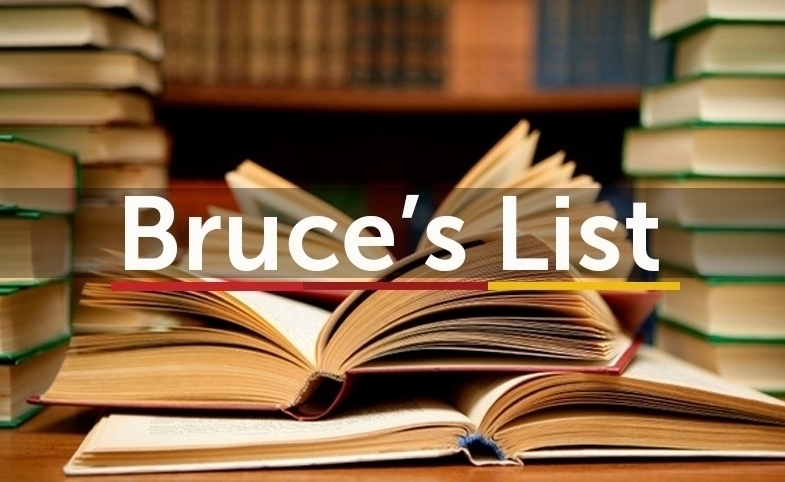
Latest Must-Reads in Public Diplomacy: March 2020
The 100th edition of CPD Faculty Fellow Bruce Gregory's public diplomacy reading list is now available. Known affectionately at CPD as "Bruce's List," this list is a compilation of books, journal articles, papers and blogs on a wide variety of PD topics and features a number of CPD scholars.
Highlights from this latest list include:
Nancy Snow and Nicholas J. Cull, eds., The Routledge Handbook of Public Diplomacy, Second Edition, (Routledge, 2020). Snow (Kyoto University of Foreign Studies) and Cull (University of Southern California) have performed a great service in compiling the chapters in this welcome second edition of The Routledge Handbook. Compared to its 2009 predecessor, it is more comprehensive and global in scope. Its conceptual approaches and diplomatic actors are more diverse. Contributors are a broader range of older and younger voices, scholars and practitioners. Following introductions by Snow and Cull, the Handbook’s 45 chapters (too many to list here) divide into six parts that examine core practices, contrasting assumptions and methods, cases that illustrate theoretical concepts, cases that portray country and regional differences, and chapters that explore ethical questions, digital technologies and innovations in study and practice. Teachers will want to look for chapters to assign that support course topics. Given its content and heft (543 pages), the paperback and eBook editions are affordably priced. As with any compilation of this size, contributions vary in quality and depth. Readers will find arguments that are provocative and evidence based, claims that prompt disagreement and vigorous debate, and subject matter that calls for more research. The Handbook is aspirational and self-described as foundational. Its impressive range of ideas and approaches prompt two evergreen questions. Should we continue to treat public diplomacy as a separate field of diplomatic study and practice? And, given so much effort by so many in this volume and elsewhere, why is diplomacy so under-represented in IR and communications studies? [read CPD's summary of this new release here]
James Pamment, “The EU Code of Practice on Disinformation: Briefing Note for the New EU Commission,” Perspectives Series #1, Carnegie Endowment for International Peace, March 2020. In this working paper, Pamment (Carnegie Endowment non-resident scholar, Lund University) observes that one year on the EU’s Code of Practice on Disinformation has “produced mixed results.” The Code’s self-regulation approach has been of questionable value in protecting publics from harm caused by disinformation. Government, industry, academic and civil society stakeholders have not built relationships based on trust. The working paper offers a variety of suggestions aimed at strengthening cross-sector relationships, developing a long-term collaborative focus on impact evaluation, and addressing problems created by the social media black market. The paper also makes three key recommendations: develop a shared methodology, develop “campaign-wide analytics” for impact evaluation, and develop an iterative consultancy process that leads to actionable evidence on the impact of information operations and counter measures.
Alicia Wanless and James Pamment, “How Do You Define a Problem Like Influence?” Journal of Information Warfare (2019) 18.3: 1014. Wanless (King’s College, London) and Pamment (Lund University) provide a literature review and thoughtful insights into terms used by industry, government and media to describe influence operations. Their article discusses how widely used terms such as fake news, misinformation, propaganda, disinformation, influence campaign, information operations, strategic communication and information war create definitional issues and operational problems for practitioners. They also explore conceptual factors relating to intent, truth, origin, and legitimacy.
US Advisory Commission on Public Diplomacy (ACPD), “Comprehensive Annual Report on Public Diplomacy & International Broadcasting: Focus on FY 2018 Budget Data,” January 2020. Written by its professional staff, Vivian Walker and Shawn Baxter, the Commission’s 70th anniversary report (256 pages) combines recommendations with an abundance of data, graphics, descriptions and budget information provided by the State Department and U.S. broadcasters on their programs and activities. The report is an important resource for diplomatic practitioners, Congressional staff and diplomacy scholars. [read CPD's summary of this report here]
The full list, including works by CPD Director Jay Wang, CPD Faculty Fellow Vivian S. Walker, and CPD Blog Contributors Paul Hare and Felicia Istad, is available here.
Visit CPD's Online Library
Explore CPD's vast online database featuring the latest books, articles, speeches and information on international organizations dedicated to public diplomacy.
Popular Blogs
-
March 22
-
April 11
-
April 1
-
March 4
-
March 19







